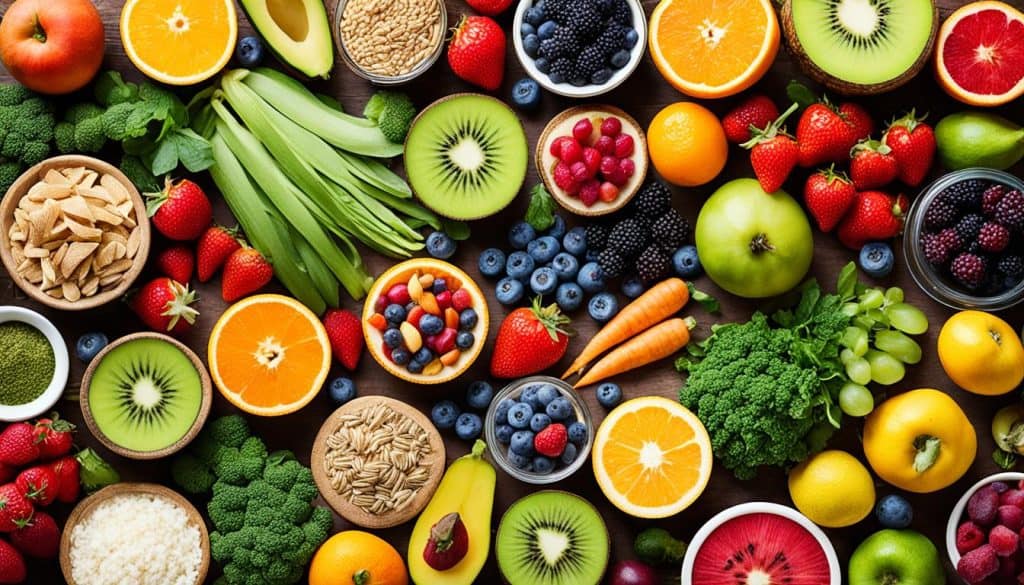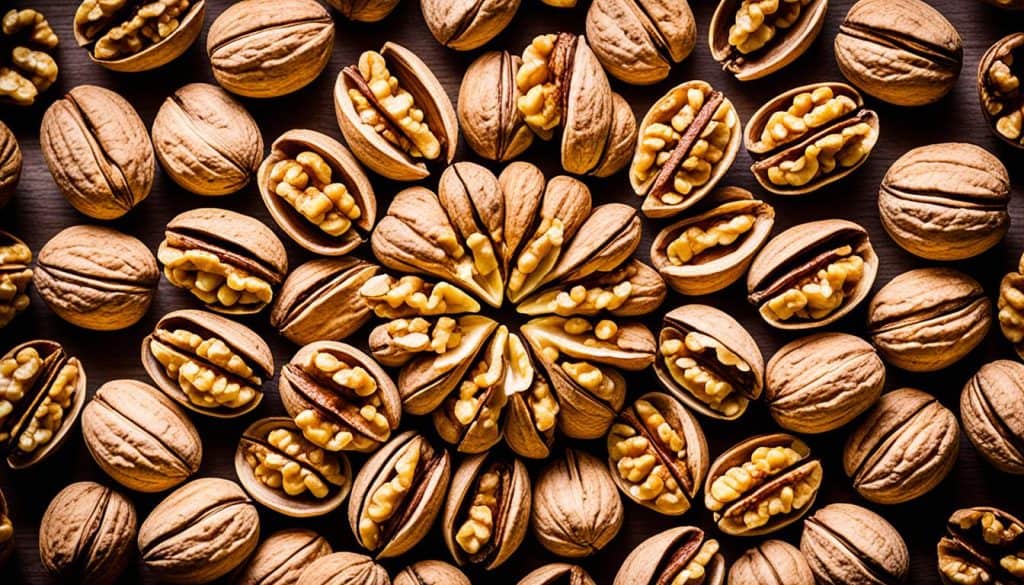When I hit my fifties, I started focusing on staying healthy and aging well. I wanted to keep my body and mind strong as I got older. That’s when I learned how important nutrition is for staying healthy and living a long life.
One sunny afternoon, I was talking about aging with my neighbor, Mary. She was in her seventies but looked and acted much younger. I was curious about what kept her so lively, so I asked her what she ate.
Mary took me to her kitchen, filled with colorful fruits and veggies. She told me how certain foods helped her stay young and healthy. She talked about extra virgin olive oil, which can lower the risk of heart disease and diabetes.
Then, she poured us green tea, full of antioxidants that fight aging and brain decline. Next, she showed me fresh salmon, packed with omega-3s and proteins, which made her skin glow and reduced inflammation.
She also pulled out dark chocolate, saying its flavanols protect her skin from sun damage and slow aging. As we drank our tea, she chopped up vibrant veggies, full of antioxidants that fight heart disease and cancer.
She added flax seeds to our salad, which fights free radicals and keeps the heart healthy. She also mentioned pomegranates, avocados, and whole-grain black rice as key foods in her diet. These foods nourish her skin, support her heart, and help with bone health.
After saying goodbye to Mary, I left feeling inspired to eat better for my health. I realized how important nutrition is for aging well. Eating these foods can help me live a long, happy life.
Key Takeaways:
- Include foods like extra virgin olive oil, green tea, fatty fish, dark chocolate, vegetables, flax seeds, pomegranates, and avocados in your diet for healthy aging and longevity.
- Eating a variety of nutrient-dense plant foods and quality animal foods can maximize nutrient intake, improve gut health, reduce inflammation, and promote better sleep.
- Foods rich in antioxidants, omega-3 fatty acids, and essential nutrients have age-delaying functions and offer protection against age-related chronic diseases.
- Embrace a balanced and wholesome diet to nourish your body and mind, paving the way for a vibrant and fulfilling life.
Impact of Nutrition on Longevity
Nutrition is key to healthy aging and living a long life. What we eat affects our health as we get older. By knowing about macronutrients like carbs, protein, fats, and fiber, we can make better food choices.
Carbohydrates give us energy and are in whole grains, fruits, and veggies. These foods are full of fiber, which helps our digestion and keeps our gut healthy. Eating these foods keeps our blood sugar stable and supports our health.
Protein is important, especially for older people. Many seniors don’t get enough protein, which can cause muscle loss and weakness. Protein helps keep our muscles strong and healthy. We can get protein from lean meats, fish, beans, and legumes.
Fats are also crucial for a long life. We should limit bad fats but eat healthy fats instead. Healthy fats like omega-3s and monounsaturated fats can lower the risk of diseases and help our hearts. Foods like fatty fish, avocados, nuts, and olive oil are great sources of these fats.
Eating a diet full of fruits, veggies, whole grains, lean proteins, and healthy fats gives us the vitamins and minerals we need. These nutrients fight oxidative stress, which can make us age faster.
The Healthy Eating Index (HEI)
The Healthy Eating Index (HEI) helps us see how good our diet is. It uses the Dietary Guidelines for Americans. Older adults usually have the best diets, scoring about 63 out of 100 on the HEI.
There are programs and resources to help seniors eat well. SNAP gives food benefits to those with low incomes. CSFP sends monthly food packages to older people. Home-Delivered Nutrition Services delivers meals to those who can’t leave home. The Child and Adult Care Food Program helps pay for meals and snacks in daycare for older adults.
The World Health Organization (WHO) also cares about healthy aging. They released a report on the Decade of Healthy Ageing in 2020. This report aims to help older adults around the world stay healthy.
In conclusion, eating a balanced diet with carbs, protein, fats, and fiber supports healthy aging. This can help us live a long and happy life.

Key Nutrients for Healthy Aging
As we age, it’s key to focus on our nutritional needs for healthy aging and longevity. By eating the right nutrients, we can boost our well-being and lower the risk of chronic diseases. Here are some important nutrients for healthy aging:
Antioxidants for Oxidative Stress Reduction
Antioxidants fight oxidative stress in our bodies, which can speed up aging and lead to chronic diseases. Eating foods high in antioxidants like berries, dark chocolate, and colorful fruits and veggies helps protect our cells. This can keep us aging healthily.
Anti-Inflammatory Foods for Overall Health
Chronic inflammation is common in age-related diseases. Eating anti-inflammatory foods can lower inflammation and help us age well. Foods like fatty fish, extra virgin olive oil, nuts, and leafy greens are great choices.
Bone Health with Calcium and Vitamin D
Strong bones are key for healthy aging, especially for postmenopausal women at risk of osteoporosis. Foods high in calcium, like dairy and leafy greens, support bone health. Vitamin D from sunlight and foods like fatty fish and fortified dairy helps with calcium absorption and bone growth.
Eating these key nutrients helps us age healthily and improves our quality of life as we get older.
The Power of Nuts for Longevity
Nuts are a powerhouse for promoting health and longevity. They are full of heart-healthy fats, antioxidants, and important nutrients. Walnuts, in particular, offer many benefits.
Studies show that eating nuts regularly can lower the risk of death. Adding nuts, especially walnuts, to your diet can greatly reduce death risk. Walnuts are especially good for longevity.
Nuts are packed with antioxidants. These protect our cells from damage. This damage is linked to aging and disease.
Nuts also have heart-healthy fats. These fats help lower cholesterol and reduce heart disease risk. Almonds and hazelnuts, for example, can increase “good” HDL cholesterol and lower “bad” LDL cholesterol.
Nuts can also help control blood sugar and reduce inflammation. For people with metabolic syndrome, eating walnuts, peanuts, and pine nuts daily for six weeks lowered cholesterol. Adding nuts to a Mediterranean diet also lowered inflammation markers.
Nuts are high in fiber, which aids in weight control by reducing calorie absorption. Increasing fiber from nuts can lead to up to 130 fewer calories absorbed.
Nuts may also affect telomere length, which is linked to aging and disease. A Mediterranean diet rich in nuts can influence telomere length and reduce stress in cells. This could slow down aging.
With their many benefits, nuts, especially walnuts, should be part of a healthy diet. Enjoy them alone, on salads, or blended into nut butter. They are a tasty and nutritious choice for any meal or snack.

The Benefits of Mushrooms for Longevity
Mushrooms, whether dried or fresh, are tasty and packed with nutrients. They can help us live longer and age healthily. Let’s look at the amazing benefits mushrooms bring to our health.
Powerhouse of Antioxidants
Mushrooms are full of antioxidants like ergothioneine and glutathione. These antioxidants protect our cells from harm caused by oxidative stress. This harm is linked to heart disease and brain diseases.

Neuroprotection and Lower Disease Risk
A study looked at 13 types of mushrooms and found porcini mushrooms have lots of antioxidants. Countries like France and Italy eat more of these mushrooms. They have fewer cases of brain diseases.
In the U.S., eating fewer of these antioxidants means more people get Parkinson’s and Alzheimer’s. Just five button mushrooms a day can help, giving you about 3 milligrams of ergothioneine.
Enhanced Longevity and Reduced Mortality
Eating mushrooms can lower the risk of dying. A study of 15,000 Americans over nearly 20 years showed that eating mushrooms was linked to a 16% lower risk of death.
Switching one mushroom serving for processed or red meat cut the risk of dying by 35%. Mushrooms are great for anyone looking to live longer.
Multiple Health Benefits
Mushrooms are good for more than just living longer. Studies show eating them can lower the risk of heart disease, brain decline, Parkinson’s disease, Crohn’s disease, frailty, and death from heart disease or any cause.
High levels of ergothioneine in the blood are linked to a lower risk of heart disease and death. This is based on a 21.4-year study of over 3,200 people in Sweden. Ergothioneine levels drop as we age, especially in those with brain problems.
The Mushroom Difference
Americans eat less ergothioneine than Europeans, especially Italians. This lower intake is linked to more chronic brain diseases and shorter lives.
A 2019 study also found that eating less ergothioneine is tied to more brain disorders and shorter lives.
Mushrooms are full of antioxidants, support brain health, and help us live longer. Adding them to your meals can bring many health benefits. Try them out today!
Green Tea for Healthy Aging
Green tea is getting a lot of attention for its health benefits as we age. It’s full of antioxidants that may lower the risk of brain problems, some cancers, and heart disease.
Antioxidants in green tea, like polyphenols, protect the body from harmful free radicals. These free radicals can damage cells and speed up aging. Drinking green tea regularly might help fight oxidative stress and inflammation. This can keep the skin healthy and slow down aging signs.
Studies show that drinking green tea can lower the risk of brain diseases, improve mouth health, and help control blood sugar. It might also reduce the risk of heart disease and obesity.
One study found that drinking five or more cups of green tea a day can lower the risk of death. Another study showed that seven cups a day can cut the risk of death by 62%, even for those with heart attack history.
The exact way green tea helps health isn’t fully known. But, its high antioxidant levels, especially EGCG, are thought to be key.
But, the studies on green tea and aging have some limits. We need more research to fully understand its benefits. This includes its effects on skin, brain, and how it affects living longer.
Still, adding green tea to a diet full of antioxidants is a tasty way to support aging health. So, why not enjoy a cup of green tea and toast to healthy, glowing skin and well-being?
The Power of Fatty Fish for Longevity
Fatty fish like salmon is a great source of nutrients for healthy aging. It tastes good and is full of omega-3 fatty acids, high-quality protein, and minerals like selenium.
Studies show eating fatty fish is good for your health. A 16-year study with almost half a million people found that eating more fish lowered death risk by 9%. Those who ate the most fish had lower risks of heart disease, cancer, respiratory issues, and liver disease.
Women also see big benefits from eating fatty fish. The women who ate the most fish had lower death rates and a 38% lower risk of Alzheimer’s disease.
Fatty fish is packed with omega-3s, which are great for the heart. Men who ate more omega-3s had a 15% lower risk of heart disease. Women saw an 18% lower risk.
This fish also has proteins that help your skin stay healthy. These proteins keep your skin looking young and elastic.
Selenium in fatty fish helps protect your skin from damage and diseases. Eating foods rich in selenium, like fatty fish, keeps your skin healthy and glowing.
To get the most benefits, eat about 4 ounces of wild-caught salmon three times a week. Other good choices include mussels, rainbow trout, mackerel, and sardines.
If you can’t eat fresh fish often, omega-3 supplements can help. They provide the nutrients you need for good health.
In summary, eating fatty fish is a smart move for healthy aging. It’s full of omega-3s, protein, selenium, and helps your skin. Don’t miss out on this nutritional powerhouse.
Other Nutritious Foods for Healthy Aging
Dark chocolate and cocoa are not just treats but also have health benefits. They are full of antioxidants and flavanols. These can help fight disease and keep your skin healthy. Adding a bit of dark chocolate or cocoa to your meals can be tasty and good for you.
Vegetables are key for staying healthy and aging well. Foods like spinach, kale, and red or orange bell peppers are packed with antioxidants. These protect your skin from the sun and help it renew itself. Eating a mix of vegetables every day can help your body stay healthy as you age.
Flax seeds are also great for healthy aging. They have lignans and omega-3 fatty acids that are good for your skin and reduce inflammation. Just a tablespoon of flax seeds on your yogurt, cereal, or smoothie can be a big nutritional boost.
Pomegranates are another fruit that helps with aging well. They’re full of antioxidants that protect your skin from sun damage. Adding pomegranates or their juice to your meals is a tasty way to keep your skin healthy.
Avocados are also good for aging well. They’re loaded with healthy fats, vitamins, and minerals. These can help you keep a healthy weight, improve your memory, and protect your skin from the sun. Putting avocado in salads, sandwiches, or making guacamole can be both delicious and healthy.
Adding foods like dark chocolate, cocoa, vegetables, flax seeds, pomegranates, and avocados to your diet can help you age well. Focus on eating a variety of nutrient-rich foods for the best health.


